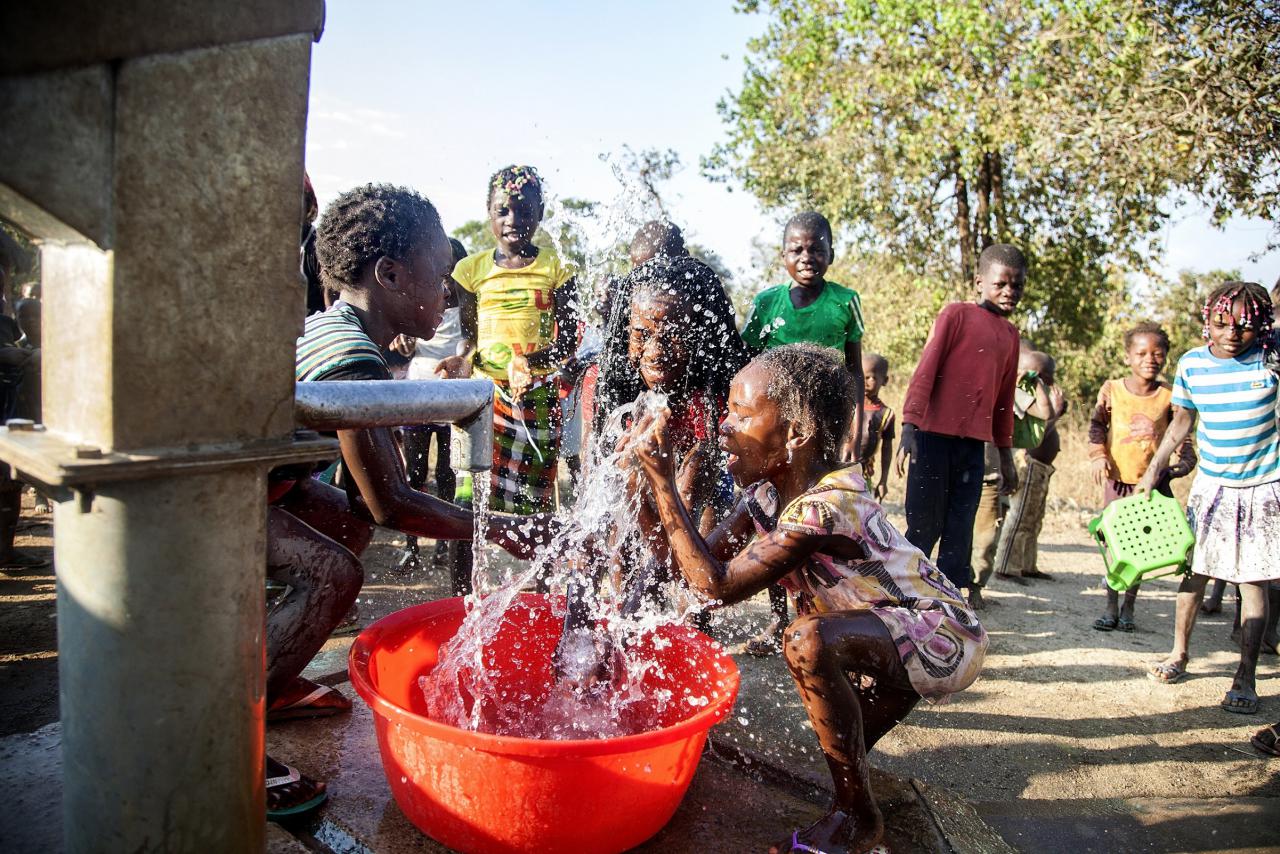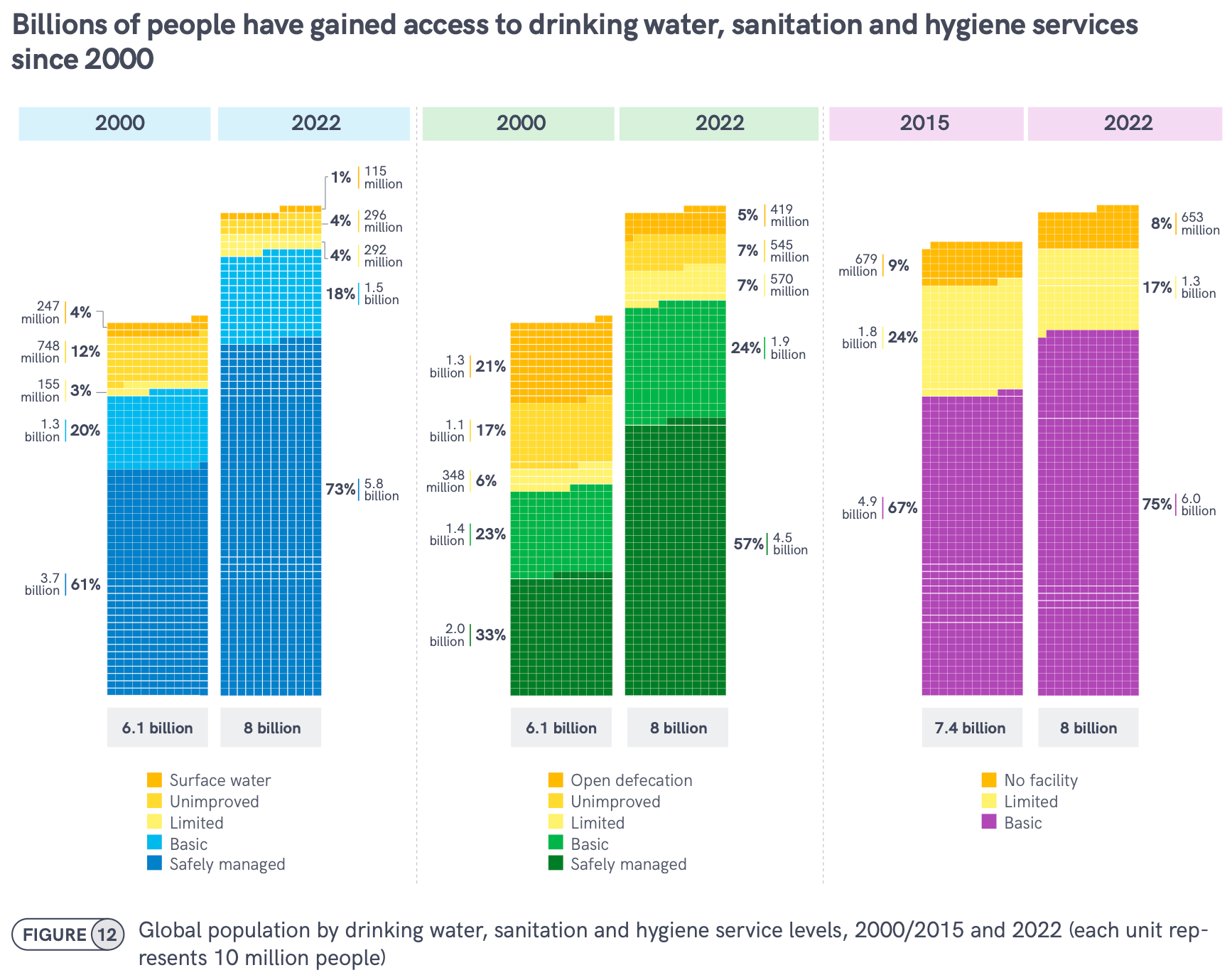Good News on Water, Sanitation and Hygiene, Poverty in the US, and Seabird Conservation

This is our weekly roundup of good news from around the world. If you'd like to get this in your inbox, you can subscribe for free below.
Good news you didn't hear about
Humanity has made astonishing progress on access to water, sanitation and hygiene in this century. Between 2000 and 2022, 2.1 billion people gained access to safe drinking water, 2.5 billion gained access to safely managed sanitation, the number of people using unimproved facilities has been halved, from 1.1 billion to 545 million, and the number practising open defecation has fallen by more than two thirds, from 1.3 billion to 419 million. WHO

Humanity has made astonishing progress on reducing drowning in the last three decades. Globally, deaths from drowning decreased by 44.5% between 1990 and 2017, from 531,956 to 295,210, and age-standardised mortality rates decreased by 57.4%, from 9.3 drownings per 100,000 people in 1990, to 4 per 100,000 in 2017. BMJ
The Mosquirix malaria vaccine has been approved for distribution across 12 African countries, with 18 million doses due to be delivered to areas with the highest risk. The vaccine has already been administered to 1.7 million children in Ghana, Kenya and Malawi since 2019, with noticeable reductions in child mortality. Guardian
Between 2016 and 2021 the number of countries recommending the HPV vaccine increased by 65%, the MCV2 vaccine for measles by 12%, and the DTPCV4 vaccine for diphtheria, tetanus and pertussis by 4%. By 2021, 33 countries provided all eight of the WHO's recommended vaccines in their immunisation schedules and 56 included all five vaccines recommended during the first year of life. WHO
Canada will spend C$30 billion on 250,000 new low-cost childcare spaces, with the aim of making childcare universally accessible for less than C$10 a day. The program is 'a transformative project on a scale with the work of previous generations of Canadians, who built a public school system and public health care.' NYT
There has been a significant reduction in poverty and income inequality in the United States. New research has shown that in 2021 and 2022, child poverty has been reduced by 40%, and the gains made by low-wage workers have reduced income disparity by 25%, the first substantial economic gains for low-wage workers in 40 years. Prospect
In 2022, the International Planned Parenthood Federation delivered 226.9 million sexual and reproductive health services, including 5 million safe abortion services, an increase of 11% from 2021. The organisation also served 10 million people in humanitarian settings, a record number, and achieved 150 advocacy wins, a 24% increase from 2021. IPPF
The Netherlands' House of Representatives has voted to introduce a consent-based definition of rape. This historic change, hailed as a victory for survivors of sexual assault, removes the requirement that rape must involve physical force, threat, or coercion. The Senate is expected to pass the amendment, making the Netherlands the 17th of 31 European states to recognise sex without consent is rape. Amnesty
The Biden administration has signed an executive order to expand and protect access to contraception under the Affordable Care Act. The order will help reduce out-of-pocket costs and increase ways for people to access contraception, as well as to increase the availability of family planning services and supplies. Reuters
The World Bank has approved $50 million to enhance public healthcare services for 6.5 million residents in Buenos Aires province who lack private health insurance. The project aims to modernise healthcare, advance digitisation in over 150 provincial hospitals and health centres, and develop telemedicine for remote medical care.
Guyana, a small country on South America’s North Atlantic coast, is on the path to universal secondary education, with the recent completion of new schools increasing high school enrolment from 87% to 93%. New policies from the government aim to reduce dropout levels and improve the overall educational experience, particularly in rural areas. World Bank
The last of the United States’ declared chemical weapons stockpile was destroyed at a sprawling military installation in eastern Kentucky last week, a milestone that closes a chapter of warfare dating back to World War I. It’s also a defining moment for arms control efforts worldwide. Colorado Sun
The World Bank divides the world's economies into four income groups: high, upper-middle, lower-middle, and low. Twenty years ago, 120 countries were classified as either low or lower-middle income. Things have changed a lot since then–the latest classifications show that only 80 countries now fall into those categories.
Give a damn
Last year we funded the installation of a new solar system and medical equipment for the Foredugu Community Health Center in Karene, a farming district in Sierra Leone. It was through the incredible people at We Care Solar. We've just heard back from them, via a report which you can read in full below.
Over the next five years over 11,000 community members, including more than 1,600 mothers and babies, will benefit from having solar lights and power at the clinic. Thank you to all our paid subscribers for making this possible. Here's a testimonial from community member, Abibatu Turay.
My name is Abibatu Turay and I am 32 years old. I am married with 3 children, my daughter (pictured) is the eldest and I have two younger boys. I have delivered all of my children either with no power or with unreliable power. Sometimes I’ll come to the health facility to deliver and the power will go out in the middle of the delivery until the end. And sometimes there is no power throughout the whole labour and delivery. This makes it very difficult.
Since the installation of the Solar Suitcase, we have been very happy. There is usually no power at this facility and on days when the facility is full and people are here until it gets dark it becomes very confusing for the patients. So, we are grateful and I pray that Allah blesses those that provided us with the suitcase.
The only home we've ever known
France is seeking to turn itself into an 'ecological civilisation.' Over the next four years the Ministry of Ecological Transition will train 5.6 million public sector workers about the climate crisis, including how to use that knowledge to change the way they work. 'The only politics that matter now are those that might arrest our rush towards the brink.' Guardian
Everyone loves a comeback story, and when it comes to animal conservation, there are a lot of them. Our friends at the Progress Network have a roundup of all the 'animal comeback' stories from the first six months of 2023, proving that amidst all of the genuinely worrying environmental news, recovery is an ongoing, global project, and we keep getting better at it.
70 years of data show that seabird conservation efforts around the world have been remarkably effective. Documenting 851 separate conservation events, targeting 138 seabird species, and spanning 551 locations, researchers found 80% of events resulted in the return of targeted species, and 76% achieved breeding within an average of two years of implementation. Nature Conservancy
Even more comebacks! 14 native giraffes have returned to Angola, signalling 'a message of hope' after wildlife was decimated during its civil war; in Tanzania, the population of the kipunji monkey has increased by 65% over the past 13 years; and Bangladesh just recorded the highest-ever number of olive ridley turtle eggs laid on its beaches this nesting season, thanks to extensive conservation actions.
A new law in Ghana will force producers of plastic packaging to collect and recycle waste that is either generated during manufacturing or dumped on the street by consumers. It’s a big step forward for a country that produces 840,000 tonnes of plastic waste each year. Afrik21
The EU Mission Restore our Ocean and Waters will give 18 new projects €106 million to support ocean conservation and create a sustainable blue economy. The projects will gather over 370 beneficiaries from 36 countries, including SMEs, research institutions, schools, and businesses, that will play a key role in restoring biodiversity and cutting pollution.
Wales has become the first UK nation to ban the use of glue traps and wild-animal snares. Animal welfare charity the RSPCA said it was a 'momentous day' for animal welfare, and it's anticipated the policy will become law later this year, paving the way for a new payment scheme to incentivise farmers to deliver the highest standards of animal welfare. Wales Online
Rewilding Spain is transforming the Iberian highlands, one of Europe’s least populated areas, back to wilderness with the reintroduction of the black vulture, Iberian lynx and Przewalski’s horse, considered to be the world’s last wild horse. The 20-year initiative is also designed to regenerate the local economy via local produce, eco-tourism and educational programs. Guardian
A new review in The Lancet has found that low emissions zones (LEZs)–designated areas within cities that restrict highly polluting vehicles–are improving our health. Data from 69 cities with LEZs found a 2%-3% reduction in heart problems and a 7%-12% reduction in strokes, with the greatest improvements in older people, saving an estimated €4.4bn in healthcare.
Leboncoin, the French online sales platform, has banned ivory items, including imitations, in order to crack down on cybercriminals in the ivory trade. With 28 million visitors to the site every month, the move will support elephant conservation efforts in Africa. Afrik21
California will protect the iconic western Joshua tree after passing legislation that appears to be the first to focus on a climate-threatened species. It’s a hard-won victory for environmentalists after a 2019 study found that only 0.02% of the species’ habitat in Joshua Tree National Park would remain viable after 2070 due to climate change. Guardian
Protections for the North Atlantic Current and Evlanov Sea Basin MPA have been strengthened after researchers discovered a 'treasure trove' of iconic marine species within its seabed habitats. The MPA, which is the size of France, was originally designated as a critical seabird hotspot, but it also boasts over 30 seamounts, deep-sea sponges and coral gardens. Bird Life
Hope Is A Verb
Meet Tony Rinaudo, an agronomist who has helped local communities in Niger reforest six million hectares of desert, without planting a single tree. It's one of the greatest environmental transformations on the planet, that has led to the restoration of land, livelihoods and dignity.
In the latest episode of our podcast, Tony shares his incredible journey from growing up in the Australian countryside to working in Niger during the famine of the 1980s, and the moment of "divine intervention" that seeded the technique of Farmer Managed Natural Regeneration, a technique that has reshaped environmental restoration efforts around the world. Tony will restore your hope in the power of science, faith and nature to mend the world.
That's all for this edition, thanks for reading. You know the drill, we'll see you next week (:
With love,
FC HQ
